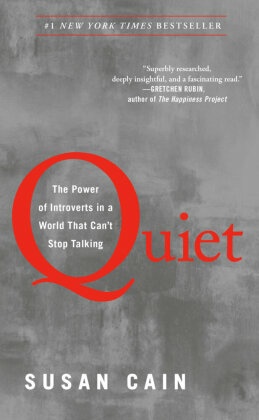
Quiet - The Power of Introverts in a World That Can't Stop Talking
| Verlag | Penguin Random House |
| Auflage | 2013 |
| Seiten | 368 |
| Format | 13,4 x 2,4 x 20,7 cm |
| Gewicht | 336 g |
| Artikeltyp | Englisches Buch |
| Reihe | Extra Libris |
| ISBN-10 | 0307352153 |
| EAN | 9780307352156 |
| Bestell-Nr | 30735215EA |
#1 NEW YORK TIMES BESTSELLER Experience the book that started the Quiet Movement and revolutionized how the world sees introverts and how introverts see themselves by offering validation, inclusion, and inspiration
Superbly researched, deeply insightful, and a fascinating read, Quiet is an indispensable resource for anyone who wants to understand the gifts of the introverted half of the population. Gretchen Rubin, author of The Happiness Project
NAMED ONE OF THE BEST BOOKS OF THE YEAR BY People O: The Oprah Magazine Christian Science Monitor Inc. Library Journal Kirkus Reviews
What are the advantages of being an introvert? They make up at least one-third of the people we know. They are the ones who prefer listening to speaking; who innovate and create but dislike self-promotion; who favor working on their own over working in teams. It is to introverts Rosa Parks, Chopin, Dr. Seuss, Steve Wozniak that we owe many of the great contributions to society.
In Quiet, Susan Cain argues that we dramatically undervalue introverts and shows how much we lose in doing so. She charts the rise of the Extrovert Ideal throughout the twentieth century and explores how deeply it has come to permeate our culture. She also introduces us to successful introverts from a witty, high-octane public speaker who recharges in solitude after his talks, to a record-breaking salesman who quietly taps into the power of questions. Passionately argued, impeccably researched, and filled with indelible stories of real people, Quiet has the power to permanently change how you see yourself.
Now with Extra Libris material, including a reader s guide and bonus content
Inhaltsverzeichnis:
Author s Note |
INTRODUCTION: The North and South of Temperament |
PART ONE: THE EXTROVERT IDEAL
1. THE RISE OF THE MIGHTY LIKEABLE FELLOW : How
Extroversion Became the Cultural Ideal |
2. THE MYTH OF CHARISMATIC LEADERSHIP: The
Culture of Personality, a Hundred Years Later |
3. WHEN COLLABORATION KILLS CREATIVITY:
The Rise of the New Groupthink and the Power of
Working Alone |
PART TWO: YOUR BIOLOGY, YOUR SELF?
4. IS TEMPERAMENT DESTINY?: Nature, Nurture, and the
Orchid Hypothesis |
5. BEYOND TEMPERAMENT: The Role of Free Will (and the
Secret of Public Speaking for Introverts) |
6. FRANKLIN WAS A POLITICIAN,
BUT ELEANOR SPOKE OUT OF CONSCIENCE :
Why Cool Is Overrated |
7. WHY DID WALL STREET CRASH AND WARREN
BUFFETT PROSPER?: How Introverts and Extroverts Think
(and Process Dopamine) Differently |
PART THREE: DO ALL CULTURES HAVE
AN EXTROVERT IDEAL?
8. SOFT POWER: Asian-Americans and the Extrovert Ideal |
PART FOUR: HOW TO LOVE, HOW TO WORK
9. WHEN SHOULD YOU ACT MORE EXTROVERTED
THAN YOU REALLY ARE? |
10. THE COMMUNICATION GAP: How to Talk to
Members of the Opposite Type |
11. ON COBBLERS AND GENERALS: How to Cultivate
Quiet Kids in a World That Can t Hear Them |
CONCLUSION: Wonderland |
A Note on the Dedication |
A Note on the Words Introvert and Extrovert |
Acknowledgments |
Notes |
Index |
